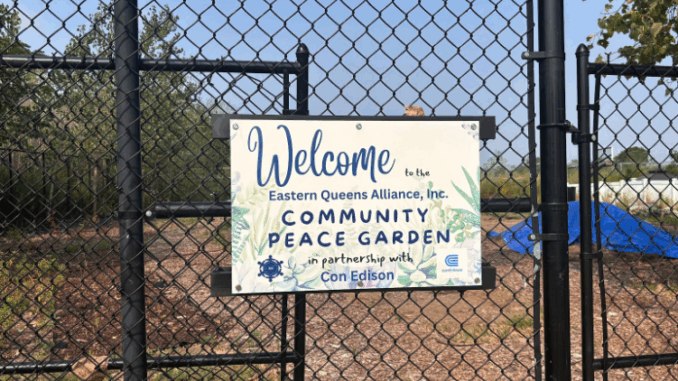
BY T’NEIL GOODEN
The Eastern Queens Alliance (EQA), a coalition that addresses conflicts around community sustainability, partnered with Con Edison over the summer to make a street lot into a maintained garden for the Laurelton community.
Community gardens have been in distress over the past few months, according to NBC New York and other news organizations, as they have been on the brink of shutting down due to the city government’s plans to sell the land to developers. However, this Queens community garden is here to stay, as it is now owned by EQA.
“The location was an unused street bed. It has for years been a blight on the community,” said Barbara E. Brown, Chairperson at EQA.
The lot was used as an illegal car and dump site. This was bad news for the community as the lot sits beside the Idelwild Environmental Center and the Blue Belt system of Idelwild wetlands.
EQA was able to get possession of the vacant land by obtaining permission from the New York City Department of Transportation (NYCDOT) to make the abandoned lot into a community peace garden.
“Just preparing the land for a viable garden has been difficult because of prior misuse,” said Brown.
Volunteers have been floating in and out of the garden weekly since August 2025, with some days being more hands-on than others. This community garden is set to be completed later this year.
“During the summer, we’ll probably get maybe two corporate volunteer groups of about 20 people coming in for a day to do major projects,” said Harold Joseph, the gardener designated to this garden. “Consistently, we usually get around five people during spring and summer.”
Many Laurelton residents are not new to volunteering, as they have been advocates for the revival of their Queens community. Gardener and Laurelton resident, Diana Alleyson-Wilson, is no different: “It [community gardens] brings people together. We get to know our neighbors because we don’t know our neighbors, we don’t know people, we see people in passing, but these community gardens get us communicating.”
The Laurelton community is a wetlands area, making the community garden compatible with environmental and ecological lifestyles.
“Aesthetically, it [the community garden] will serve to beautify the area,” Brown said. The community garden not only provides a serene space, but it also gives opportunities for people in the community to get involved and volunteer their time and passion to gardening projects.
“It offers opportunities for fostering biodiversity, mindfulness through walking of the labyrinth, and a variety of possible community-wide activities offered by EQA and the center,” Brown said.
EQA prides itself on being an organization focused on supporting sustainable practices. The making of the garden will also follow this clause. “We are trying to use more native low-maintenance plantings here,” Joseph said, which will require a smaller amount of water.
“We are also trying to cut down on the space so we wouldn’t have to rely on mowing the space itself,” he said.
Householders within this community are trusting of community gardens as they allow more people to be attuned with each other and their environment. “It [Community Gardens] is about the coexistence of us all and recognizing that we all need to coexist with each other,” Alleyson-Wilson said.
